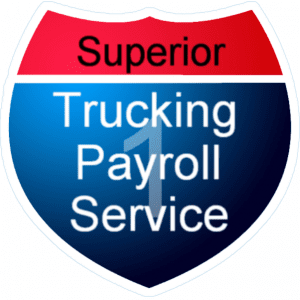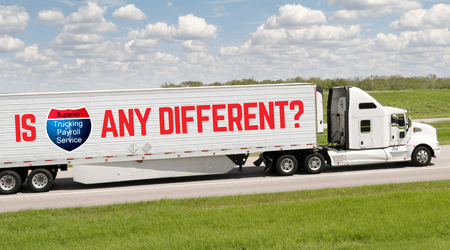Payroll in trucking can be complicated, especially when it comes to garnishments. These are court-ordered deductions from a driver’s paycheck for things like unpaid debts, taxes, or legal reasons.
As a trucking company, it’s important to understand the different types of garnishments and how to handle them correctly. This helps you stay compliant and avoid legal trouble.

Understanding Wage Garnishments
Wage garnishments are court-ordered deductions from an employee’s paycheck to pay off debts. These can include credit card debt, bankruptcy payments, or student loans.
Trucking companies must follow garnishment orders exactly to stay compliant. The order will say how much to deduct and for how long. Ignoring these rules can lead to legal trouble.
Having a good payroll system helps make sure garnishments are handled correctly—protecting both the employee and the company.

What Is a Tax Levy on Wages?
A tax levy occurs when the IRS or state tax agency takes part of an employee’s paycheck to cover unpaid taxes. This can happen for many reasons, such as filing errors, missed tax payments, or financial struggles.
Employers must follow tax levy orders by withholding the required amount and sending it to the right tax agency. Ignoring a levy can lead to fines and legal trouble, so it’s important to handle them correctly.
What Are Friend of the Court (FOC) Orders?
Friend of the Court (FOC) orders, also called domestic relations orders, are court orders that require employers to take money from an employee’s paycheck for child support, spousal support, or other family payments.
The amount depends on things like the number of children, their ages, and any overdue payments. The court decides how much to withhold based on the employee’s pay schedule. By law, up to 50-65% of an employee’s disposable income can be garnished, depending on whether they support another spouse or child and if back payments are owed.
Trucking companies must follow FOC orders carefully to make sure payments are correct and sent on time to the right person. Not following the order can lead to penalties or legal issues.

Legal Requirements for Employers
Employers must follow the law when handling wage garnishments. They are responsible for making sure payments are accurate and sent on time to the right person or agency. Ignoring these orders can lead to fines or legal trouble.
Here are therules employers need to follow:
-
Following Garnishment Orders
Employers must follow garnishment orders from courts or government agencies, including wage garnishments, tax levies, and Friend of the Court (FOC) orders. This means they need to accurately calculate and withhold the correct amount from the employee’s paycheck and send the payment on time to the right person or agency. Failing to do this can lead to penalties or legal issues, so it’s important to handle garnishments carefully.
-
Garnishment Termination Letters
If a garnishment order has a set dollar amount, employers can stop withholding once that total has been reached. However, for FOC orders, tax levies, bankruptcy orders, and student loan garnishments, deductions must continue until an official termination letter is received from the issuing authority. Employers must keep accurate records and stop deductions as soon as they receive the termination notice to stay compliant.
-
Verifying Garnishment Completion
Employers should not rely on an employee’s word or assume that a garnishment is complete. Instead, they must get official proof, such as a termination letter or payment receipt from the court, tax agency, or creditor. This ensures the garnishment is properly handled and avoids legal issues.
-
Keeping Proper Records
Good documentation is key to staying compliant with garnishment orders and avoiding legal issues. Employers should keep clear records of all garnishment-related communications, payments, and termination letters. This helps ensure transparency, accuracy, and protection in case of any disputes.
-
Getting Expert Help
If a garnishment order is unclear or complicated, employers should talk to a lawyer or payroll expert to make sure they follow the law. Getting the right advice can prevent mistakes, reduce risks, and avoid costly penalties.
By knowing and following these rules, employers can handle garnishments with confidence and avoid compliance issues. Superior Trucking Payroll Service provides expert support to help businesses manage payroll and follow garnishment orders correctly, making the process easy and stress-free.

Get Help from Superior Trucking Payroll Service
At Superior Trucking Payroll Service, we know that garnishments can be complicated and time-consuming for trucking companies. Our payroll experts help you manage garnishment orders, stay compliant, and reduce the stress of payroll processing. When you outsource your payroll to us, you can focus on running your business while we take care of the details.
Final Thoughts
Handling garnishments the right way is important for trucking companies to stay compliant and avoid legal issues. Understanding the different types, following the rules, and getting help from payroll experts like Superior Trucking Payroll Service can make the process easier and stress-free. With the right support, you can stay on top of garnishments and keep your payroll running smoothly.
With our expertise and personalized service, we make managing garnishments and payroll easy for trucking companies. Superior Trucking Payroll Service takes the stress out of payroll so you can focus on your business.
Contact us today to see how we can help with your payroll needs and keep you compliant with garnishment orders. Take the first step toward payroll peace of mind with Superior Trucking Payroll Service!

Written by Harley Holden
Harley joined Superior Trucking Payroll Service (STPS) in early 2019. With nine years of customer service experience, she truly understands what it takes to make our clients happy. She loves working at STPS because of the family-like atmosphere. Harley’s favorite place to be is Traverse City, Michigan or anywhere that has hippos.



